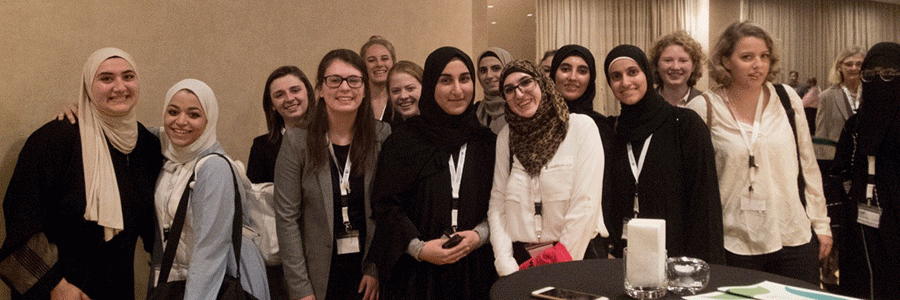JSC students present research at World Congress in Qatar
Last semester, the importance of undergraduate research was highlighted when JSC students Heather Murphy, Shayna Bennett, and Shavonna Bent, along with JSC professor Dr. Elizabeth Dolci, traveled to Doha, Qatar, to take part in the First International World Congress on Undergraduate Research (WCUR).
Murphy, a senior, stated that the conference featured students from the Middle East, the United States, Australia and Europe. The research that students presented covered an array of different themes. “The themes were contemporary issues that as a global society, we are interested in addressing,” said Dolci.
How did this trip all come about? Bent, a junior, remarked that Steven Lamonde, an environmental science major and a recent graduate from JSC, suggested WCUR to students. “Steven let Shayna know, and then she got the ball rolling,” said Bent. To be accepted into the conference, an abstract of each student’s research had to be submitted to WCUR. The students submitted the abstract in spring of 2016.
“It was a combination of Shavonna’s project on antibiotic production, my project on antibiotic resistance and Shayna’s project on cadmium tolerance,” said Murphy. According to Bent, all three projects focused on profiling the characteristics of the aquatic bacterial community at the Vermont Asbestos Group Mine.
“Our question was fairly simple; how have humans impacted [the aquatic bacterial] community in comparison to other nearby sites? [The Vermont Asbestos Group Mine] is particularly interesting as it has been affected by anthropogenic activity, but it has not been exposed to biomedical or agricultural inputs, and it has largely been left untouched since 1993.
“Many sites that are studied to deduce human impact have been exposed to these other inputs and are not isolated. Our team asked if the bacteria isolated were resistant to heavy metals, resistant to antibiotics and if any produced antibiotics. We found that within a somewhat limited data set, a few isolates did display all three characteristics. Moving forward we would like to determine levels of heavy metals and antibiotics that the bacteria are resistant to, and if they produce any novel antibiotics,” said Bent.
Bennett, a senior, commented that their abstract was reviewed by a board that was put together by the conference. After the reviewing process was completed, the students were notified the results. “We found out towards the end of the summer that we were going to go, and that our abstract had been accepted,” recalled Bent.
After finding out their abstract was accepted, they had to decide whether or not they could afford to take the trip. Financially speaking, traveling to the Middle East can be quite a burden. So where did they get the funds? According to Murphy, they found the funds through JSC and through the Vermont Genetics Network, along with the National Science Foundation’s START grant. Once everything was set in place, they departed from Burlington airport on Nov. 10.
The conference took place at Qatar University. Murphy said that they prepared a poster for their presentation, and they were allowed a one-hour time slot to present and to take questions and comments from their audience. “There was some pretty good interest,” said Murphy.
They returned to Vermont on Nov. 16. When asked if it was a positive experience, all three students along with Dolci agreed that the experience was exceptional. “Professionally and socially and culturally, it was just a phenomenal experience,” said Dolci.
She also stated that the research that was done by undergraduates, despite where they came from in the world, was of a very high quality. “It showed me how similar students are regardless of where they come from and what culture they come from, but then how different they are as well,” said Dolci.
Additionally, all could agree that the food was outstanding, that Qatar was beautiful and that the people were welcoming. Dolci affirmed that the side trips they took were a nice addition to the scientific component of the trip.
Of these side trips she recalled a war exhibit at Qatar’s cultural center that featured a sculpture depicting the perspective of people who were attacked during the Iraqi war. They also visited a village named Katara Cultural, which contained an Al Jazeera café. Displayed in the café were plexiglass boxes carrying clothing and other artifacts of a Guantanamo prisoner and also of reporters who had covered the Iraqi war.
“We were shown a different perspective,” said Dolci.
According to Dolci, more trips like this are likely. “They plan to continue them every few years,” said Dolci. She also mentioned that having this conference in a non-Western country was significant and had a great impact on her and on her students. Bent commented that both undergraduate research and collaboration internationally are going to grow in importance in the coming years. “I hope that other people [participate], and [that] other people from Johnson go,” said Bent.
According to Murphy, conferences such as these also provide undergraduate students with the necessary experience they need, in order to either secure a potential career or to continue on to graduate school. “If a student wants to go to graduate school, undergraduate research is key,” said Murphy.



